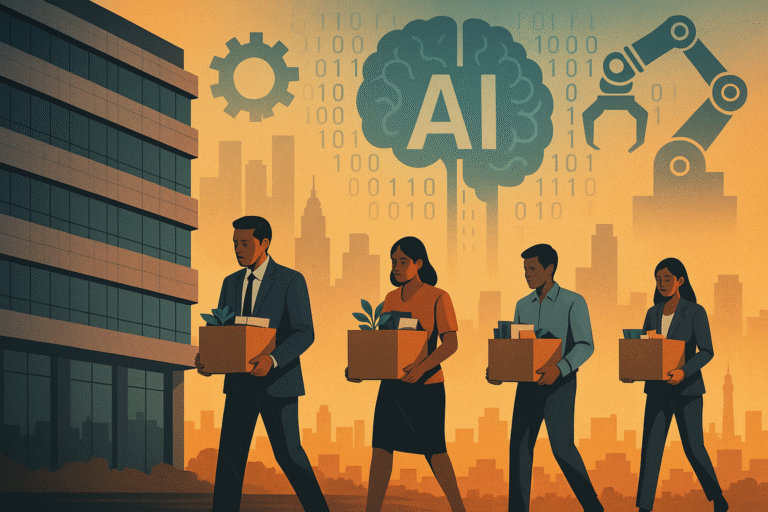
India’s booming tech sector, once the beacon of white-collar employment and economic hope, is now at a crossroads. Tata Consultancy Services (TCS), the country’s largest IT services company and private-sector employer, recently announced a workforce reduction of over 12,000 jobs, primarily targeting middle and senior management. This strategic downsizing represents 2% of TCS’s total workforce and signals a major shift in India’s $283 billion IT industry.
Why Is TCS Cutting Jobs?
According to TCS, this move is part of a broader plan to become “future-ready” as it pivots towards AI-powered innovation and business model transformation. The firm is investing heavily in automation, cloud computing, and artificial intelligence, prompting a reassessment of its traditional labor-intensive service model.
For decades, Indian IT giants like TCS thrived on delivering cost-effective solutions through a vast pool of skilled professionals. But with AI automating many routine tasks, global clients now demand innovation over cost-savings. This shift has rendered many mid-level managerial roles redundant.
“People managers are being let go while the doers are being kept to rationalise the workforce,” said Neeti Sharma, CEO of staffing firm TeamLease Digital.
Skills Gap and Rising Demand for AI Talent
Despite the AI boom, hiring in emerging technologies like cloud, data security, and machine learning hasn’t kept pace with job cuts. According to Nasscom, India will require at least 1 million AI professionals by 2026, but less than 20% of the current IT workforce possesses relevant AI skills.
Companies are investing in upskilling, but those unable to transition are being laid off. Rishi Shah, economist at Grant Thornton Bharat, explains this shift:
“AI is forcing companies to restructure their workforce, reallocating resources to roles that complement AI, not compete with it.”
Economic Impact: From Real Estate to Graduate Employment
The broader implications are troubling. TCS’s announcement reflects deeper growth challenges within India’s tech sector. According to Jeffries, net hiring across the industry has been weak since FY22, driven by a global slowdown, U.S. tariffs, and AI-driven cost rationalization.
The result? Cities like Bengaluru, Hyderabad, and Pune, once booming tech hubs, are now witnessing job losses and reduced hiring. Around 50,000 IT professionals lost jobs in 2024, and net employee additions among India’s top six IT firms dropped by 72%.
Shrinking Opportunities for Fresh Graduates
India produces millions of graduates annually, many of whom once saw IT as a secure career path. But those dreams are fading. Until recently, top IT firms hired 600,000 freshers each year. That number has now fallen to around 150,000. Even with new opportunities in fintech and Global Capability Centers (GCCs), experts warn that 20-25% of new graduates may remain unemployed.
“GCCs will never match the hiring volume of IT firms,” Sharma emphasizes.
Middle-Class at Risk: A Domino Effect
The consequences go beyond employment. India’s middle class, built on IT prosperity, is now under threat. Falling job security could trigger a real estate slowdown, reduced consumer spending, and lower premium product demand.
Financial expert D. Muthukrishnan warned on X that tech layoffs could impact allied sectors and slow economic momentum. Meanwhile, Arindam Paul, founder of Atomberg, cautioned on LinkedIn that up to 50% of white-collar jobs could vanish in the near future.
“That would mean the end of the middle class and India’s consumption story,” Paul wrote
The Road Ahead: Reinvention or Regression?
India’s tech sector must now choose between reinvention and stagnation. As global competition intensifies and automation grows, Indian companies must embrace reskilling, agile business models, and AI-centric innovation.
Whether India can retain its global tech edge and continue expanding its middle class will determine its ability to maintain sustainable GDP growth in the AI age.
Key Takeaways:
- TCS is laying off 12,000+ employees as it shifts to AI-led operations.
- India faces a severe skills mismatch in its IT workforce.
- Fresh graduate hiring has dropped by 75% since its peak.
- The ripple effects threaten India’s middle class and economic growth.
- Urgent investment in upskilling and AI education is needed to secure India’s tech future.